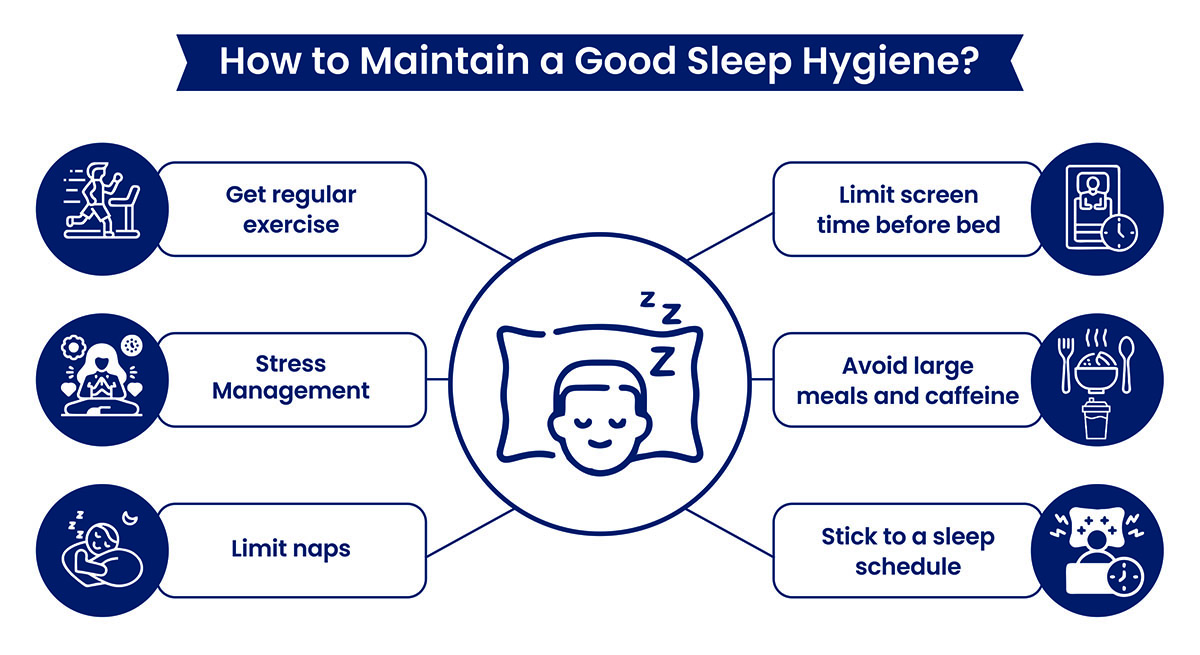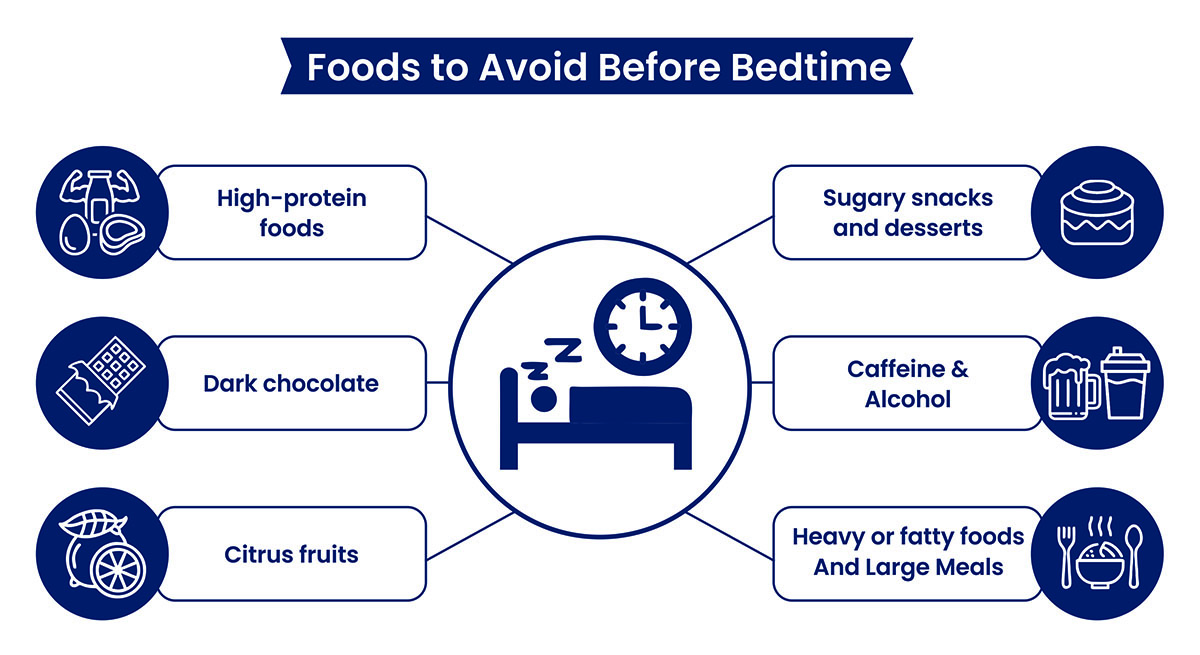A good night's sleep is to achieve well-rested physical and mental health. However, many individuals do not attain restful sleep at night. Stress, environment, and lifestyle all share responsibility, but diet is the most underdeveloped factor since what you eat can greatly affect your relaxation and ability to fall asleep.
Some sleep-promoting foods may release hormones regulating sleep, while others offer fundamental nutrients. For instance, magnesium and tryptophan can cause your body to relax, while foods with many antioxidants help reduce the effects of stress.
This blog will provide you with the best foods for sleep and some guidance on maintaining proper sleeping hygiene. Mindful choices regarding your diet will help your natural body processes to sleep well into the sweet rest of refreshed wakefulness.
What is Sleep Hygiene?
Sleep hygiene is the acquisition of habits and practices that promote good quality sleep and health. It is a set of behaviors and environmental factors that can help one sleep peacefully through the night. The most significant areas include sticking to a regular pattern—you go to bed and wake up at the same hour every day—and developing a comfortable, dimly lit, quiet, and cool sleep environment.
Reducing exposure to screens at bedtime and enacting relaxation techniques, such as deep breathing, also have important roles. Being mindful of what you eat and drink is also something to be watched. Physical activity can also help sleep, but vigorous exercise should avoid being done too close to bedtime. Through such good sleep hygiene practices, one could become a more efficient sleeper and lead a more fulfilling life.

13 Best Foods and Drinks that Help You Sleep Better
Sleep is an activity that keeps your body healthy and happy. To achieve a perfect night's sleep, you must be careful about your intake of foods and beverages. So, it is great to outline all the foods and drinks that help achieve better-quality sleep.
1. Almonds
Almonds are full of magnesium, which helps regulate sleep and reduces cortisol, a stress hormone. A little handful of almonds before bedtime may help with better sleep.
2. Kiwi
Kiwis contain high levels of antioxidants and serotonin that may induce sleep onset duration and even increase efficiency. Eating one hour before sleeping can improve sleep quality. The high vitamin C factor also accounts for their health benefits.
3. Fatty Fish
Among high levels of omega-3 fatty acids and vitamin D, it is noted that fish like salmon, mackerel, and sardines have good quality sleep. Omega-3s regulate the serotonin hormone, which is fundamental in sleep. A few portions of fatty fish every week have been known to provide many good benefits for your sleep patterns.
4. Oatmeal
Oatmeal is a soothing bedtime snack that encourages sleep. It contains melatonin, which regulates sleep-wake cycles. A warm bowl of oatmeal will cause a slight rise in insulin, making tryptophan available to the brain. Tryptophan relaxes and makes you feel drowsy.
5. Chamomile Tea
Chamomile tea is supposed to be an effective sleep solution. Its antioxidants are believed to encourage sleepiness and inhibit sleeplessness. Chamomile tea before bed soothes consumers, preparing them for a good night's sleep.
6. Bananas
Bananas are rich in potassium and magnesium minerals that may assist in relaxing nerves and muscles. They also contain tryptophan, an amino acid that can enhance the production of sleep-inducing hormones, making it easier to have a better sleep quality after consumption before bedtime.
7. Turkey
Turkey is rich in tryptophan, which eventually increases the production of serotonin and melatonin. Although most people identify turkey as food only for holidays, one may indeed have turkey as part of their daily food plan if it is intended to bring better sleep, especially when taken in the evening.
8. Cherries
Tart cherries are one of the few natural food sources of melatonin, a little hormone that plays a big role in helping regulate your sleep cycle. Drinking tart cherry juice or snacking on fresh cherries in the evening can improve your quality and duration of sleep.
9. Walnuts
Walnuts are rich in healthy fats and contain high levels of melatonin. Including walnuts in your diet can increase your blood levels of this important hormone, enhancing your sleep.
10. Fat-Free Yogurt
Yogurt, for instance, has a very high calcium content. Calcium facilitates the transport of tryptophan to the brain to increase melatonin production. Yogurt, if fat-free or low-fat, is a good food source at night and is served as a snack with fruits like bananas or berries.
11. Green Tea
While it has the characteristic wakefulness associated with a caffeine molecule, some green tea, like decaf green tea, contains an amino acid called L-theanine that triggers relaxation and may help you sleep. Drinking one at night is a calming ritual.
12. Malted Milk
Malted milk is a comforting beverage rich in tryptophan, an amino acid that may help produce serotonin and melatonin hormones regulating sleep. Such a mug-warm and comforting can lull one to be relaxed and drowsy before sleep. The carbohydrates in malted milk also increase the ingestion of tryptophan. Therefore, malted milk remains a good drink for the evening.
13. Rice
Rice, specifically white rice, has a very high glycemic index; therefore, it raises insulin levels, and the tryptophan can enter the brain. Enjoy your rice in the evening, as it makes you feel all snug and sleepy. The comfort food's texture is soothing and pairs excellent with other sleep-inducing foods.

What Not to Consume Before Going to Bed?
To promote better sleep, you must be mindful of what you eat and drink in the hours leading up to bedtime. Certain foods and beverages can interfere with your ability to fall asleep. Here’s a list of what to avoid before going to bed:
1. Caffeine is a stimulant in coffee, tea, chocolate, and soft drinks. Consumed during the afternoon or evening, caffeine disrupts your sleep cycle, making it difficult to fall asleep and maintain.
2. Alcohol can make you feel drowsy at first, but alcohol disrupts the normal sleep cycle, which will further fragment and not be as restorative for sleep. It causes you to wake up at night as well as aggravate sleep apnea.
3. Consumption of spicy or large meals may lead to discomfort, indigestion, and heartburn, making sleeping challenging. Avoid heavy meals a few hours before bedtime.
4. Foods that contain a lot of sugar raise blood sugar levels. This is followed by a crash in energy levels that can disturb sleep, making it difficult to maintain sleep through the night.
5. Greasy food can cause indigestion and discomfort, which makes it difficult to relax and sleep. Eat light food at night.
6. Too much fluid before bed increases toilet visits at night and disrupts sleep.
7. Many pre-packaged snacks contain high amounts of sugar, sodium, and unhealthy fats, negatively impacting sleep. Focus on consuming whole foods.
8. It is delicious, but chocolate contains caffeine and theobromine, which will keep you awake; dark chocolate has a higher caffeine level.
Final Thoughts
Dieting is always important for health; one must take specific measures to sleep soundly. Sleep-inducing foods like almonds, kiwi, and fatty fish can facilitate relaxation. Avoiding caffeine, alcohol, and heavy meals is indispensable for good-quality sleep.
By practicing good sleep hygiene and making conscious, healthy dietary choices, you can set the stage for restorative sleep. Conscious habits energize days and health at large.












